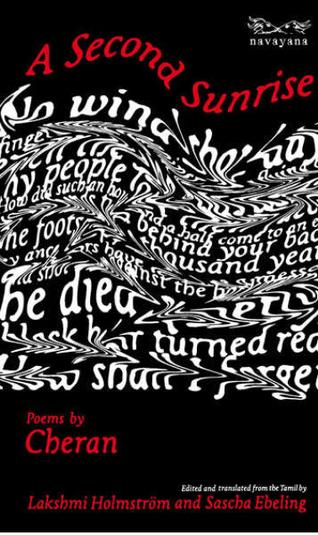Ilankai Tamil Sangam30th Year on the Web Association of Tamils of Sri Lanka in the USA |
||||
 Home Home Archives Archives |
Magically Cheranby K. Srilata, The Hindu, Madras, May 6, 2012
Themes of love and war are powerfully yoked together in fine lyrical verse. K. Srilata
It is a book I didn't want to get to the end of. Because I wanted to taste the poems slowly, word by word. The Sri Lankan Tamil poet Rudhramoorthy Cheran writes with tenderness and precision about love, the sea, war, loss and devastation. Brilliantly translated from Tamil by Lakshmi Holmström and Sascha Ebeling, A Second Sunrise contains some of Cheran's finest, most lyrical poems. The poems are like mini-bombs set to blow a hole through your heart. They bear witness to the tragedy of the Sri Lankan civil war, a war that Cheran describes as an “apocalypse” in a poem of the same name: “We have all gone away; / there is no one to tell our story./ Now there is left/ only a great land wounded.” And yet Cheran is telling us that story. As Sascha Ebeling points out in his afterword, there is hope in the story that Cheran tells us, hope in the fact that writing survives even in a wounded land. Words must bear witness where nothing else can. “I could forget all this,” Cheran says, proceeding to list half a dozen gruesome war sights. The poems conclude by gesturing gently towards the rape and killing of an upcountry Tamil woman, a tea estate worker who was cooking rice in a pot even as her children sat hidden beneath the tea bushes. “How shall I forget the broken shards/ and the scattered rice/ lying parched upon the earth?” Quick images In the spell they wield over us, some of the poems might as well be witchcraft. The images are quick and sharp: “Upon your rain-streaked face/ a single strand of wet hair/ falls to your neck/ a lamb gone astray.” (“A Rainy Day”) The personal is always stretched to invoke the political, and relationships teeter on the edge of the war that is raging. Partly autobiographical, “A Letter to a Sinhala Friend” describes the poet's meeting with a young Sinhala woman during an archaeological excavation of the ancient city of Maanthai. The poet and the Sinhala woman are drawn to one another and for a delicious, if temporary, moment in time the war is almost forgotten. Cheran offers a tongue-in-cheek description of the stereotypes held by the Sinhala people about the Tamils, a people from an “unseen and distant land” who (as the Sinhala woman has doubtless heard) “sow lead-shot from guns/ instead of seeds; a place/ half full of two-storey houses,/ half full of terrorists”. That stereotype now lies broken and the poet poses before the Sinhala woman the obvious question: “Did our different languages, after all,/ put such distance between us/ that we could not smile together/ savouring/ the beauty of falling ponnocchi flowers…?” A poem that is quintessentially Cheran in the way it yokes together the themes of love and war. The devastation that war brings in its wake is powerfully expressed in “Amma, Don't Weep”, a poem about a woman who has lost her husband and must now raise her little boy. In a land where there is “no longer a Pandyan king/ to recognise blood-guilt”, the poet advises the woman to tell her young son that “this sorrow continues/ tell him the story of the spreading blood/ tell him to wage war/ to end these cruelties.” A Second Sunrise was written on the occasion of the burning of the Jaffna Public Library in 1981 by Sinhala policemen. Many rare books and manuscripts were consumed by the fire. The poem's quiet, almost eerie beginning sets the stage for what is to come: “No wind that day;/ even the sea was dead, no waves rising.” The poet sees “another sunrise”, the burning of the library. In a clarion call for action, he asks his people: “Who were you waiting for,/ your hands tied behind your backs?... Out of the streets/ where the embers still bloom,/ rise, march forward.” Anger and anguish in Cheran's work are tempered by a quiet, deep stillness, a stillness that is reflected most fully in his awareness of the sea, a recurring image in many of his poems: “Waves lap along the shore/ spreading within me/ the sea” (“The Sea”). Playful poetry On occasion, the poems are playful. “Kissing a Woman with Glasses in the Summer”, for instance. As Lakshmi Holmström points out in her note on the translations, Cheran is also writing from within the Tamil poetic tradition, drawing on its categories of akam (the inner poetry of love) and puram (the public poetry of war). Given syntactical and other differences between languages, poetry is never easy to translate. Perfect equivalence or word by word “faithfulness” is not a sensible goal. In the translations of Holmström and Ebeling, Cheran's poetry lives and breathes anew, retaining its magic of image, mood and tone. |
|||
|
||||
